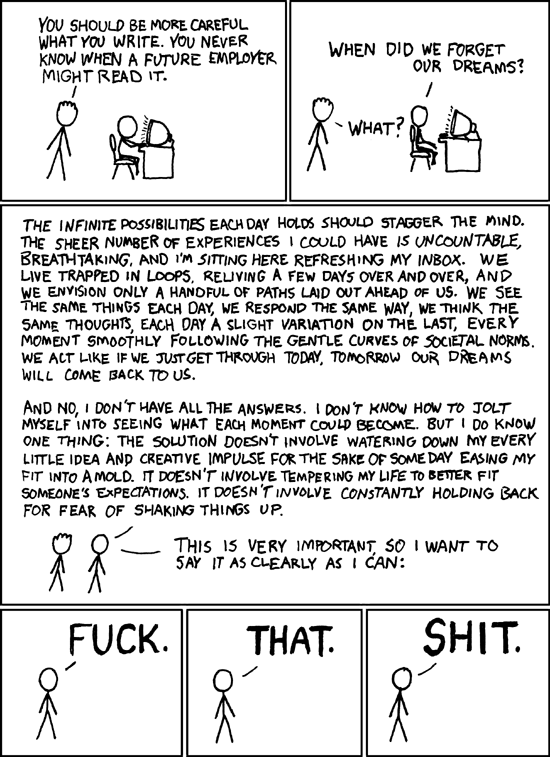About a year or so ago, I met a friend of a friend who runs a pretty successful internet start-up. We chatted a bit online for a few weeks, during the course of which, he googled me. He found some of my KinkForAll videos.
He proceeded to give me stern warnings. Much like the one mentioned here, only with a stronger overtone of “I am a Successful Person and know about these things.”
I didn’t do a very good job of saying I don’t care. And I still don’t do the best of jobs explaining why, for instance, this blog is still linked to my professional page.
You all like XKCD, right? You all think Randall Munroe is a pretty smart guy, and it’s worth paying attention to the stuff in his comics?
PS thanks to Sara Eileen for re-pointing me to this comic.

sometimes people say that to us because they care about us 🙂
i have a very good friend from college who kept telling me that i posted too many things online. then one day i finally deactivated the facebook account to make him happy.
while artists can post their oil paintings in the gallery with their concepts not exactly been accepted by everyone
there’s nothing wrong to post words on the internet as long as nobody was hurt~~~
I wholeheartedly agree with this post! On a related topic, educating people about how visible their information is on the internet is a very important thing. It is not clear exactly how well-informed people are about information visibility, but my guess is, not very well.
In your case, you’re obviously making a conscious choice to keep that information visible and tied to you, and I think that anyone who would judge you based on that information is a bit close-minded. But there’s lots of folk out there who assume a context bound for their information that simply doesn’t hold. For example, a high schooler may assume that only her high school friends will see pictures she posts online, but that may not be the case, and it’s important for her to understand that so she can make the choice about what she wants to post.
As I’m writing this, I reflect that these very words, while they are intended to empower choices, sometimes constrain them. When I say “choice about what she wants to post” I imply that there are things she may not, a priori, want to post, without knowing anything about this hypothetical person. That’s a bad assumption. People should be encouraged to self-present and generate their own contexts. Perhaps there should be a counterpart to educating people about visibility on the Internet – educating people about sharing and being open-minded on the Internet. Who knows, with this sort of education, people might actually think twice about acting like jerks online 🙂 (But perhaps that’s too optimistic)